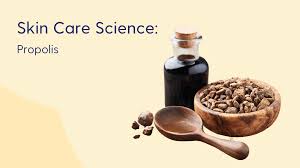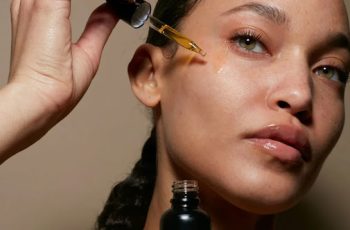
The Science of Propolis In Skin Care
Sometimes referred to as “bee glue,” propolis is a sticky substance that bees make to hold their hives together and keep unwanted guests – like bacteria and fungi – out. Propolis is more than just a sticky bee construction material, though. It has been used by people for centuries for a variety of medicinal properties. Today, it is best known for its use in skin care products, thanks to its antimicrobial and anti-inflammatory properties. In this guide, you’ll learn more about what propolis in skin care is, its benefits and side effects, and which skin types it’s best for.
Propolis is a natural substance made by bees to seal their hives.
Propolis in skin care provides antimicrobial and anti-inflammatory benefits.
People with allergies to bees should not use propolis in skin care.
What Is Propolis?
Propolis is a resinous substance that bees produce by mixing saliva and beeswax with secretions gathered from tree buds, sap flows, or other plants. Propolis is used by bees to seal gaps in the hive, reinforce the hive’s structure, and protect it from external threats.
Propolis has been used by humans for thousands of years, particularly in ancient civilizations like Egypt, where it was used for its medicinal properties. In modern times, it has gained popularity in skin care for its ability to protect, heal, and rejuvenate the skin.
Active Compounds in Propolis
The efficacy of propolis in skin care can be attributed to its rich composition of bioactive compounds. These include:
Flavonoids. Propolis is rich in flavonoids, which are potent antioxidants that help to protect the skin from free radicals and oxidative stress. These compounds also have anti-inflammatory properties, making propolis effective in soothing irritated skin.
Phenolic acids. These compounds are known for their antimicrobial and anti-inflammatory properties. They play a significant role in protecting the skin from infections and promoting healing.
Terpenes. Terpenes in propolis have strong antimicrobial effects, which help to keep the skin clear of acne-causing bacteria and other pathogens.
Essential oils. Propolis contains a variety of essential oils that contribute to its healing properties. These oils help to soothe the skin and reduce inflammation.
Amino acids. Amino acids in propolis support skin regeneration by promoting collagen synthesis, which is crucial for maintaining skin elasticity and reducing the appearance of fine lines and wrinkles.
Benefits of Propolis in Skin Care
Propolis offers a wide range of benefits for the skin, making it a versatile ingredient in skin care products. Some of its key benefits include:
Anti-inflammatory and skin-soothing properties. Propolis in skin care is effective for reducing inflammation, making it ideal for treating skin conditions like acne, eczema, and rosacea. Its soothing properties also help to calm irritated skin and reduce redness.
Antimicrobial properties. Thanks to its many flavonoids and phenolic acids, propolis in skin care acts as a natural antimicrobial agent. It helps to fight off bacteria, fungi, and viruses, making it beneficial for acne-prone skin and for preventing infections in minor cuts and wounds.
Healing and regeneration. Propolis promotes the regeneration of skin cells and accelerates the healing process. This makes it an excellent ingredient for treating damaged skin, scars, and sunburns.
Anti-aging. The antioxidant properties of propolis help to neutralize free radicals, which are responsible for premature aging. By protecting the skin from oxidative stress, propolis helps to maintain a youthful appearance, reduce the appearance of wrinkles, and improve skin texture.
Side Effects of Propolis in Skin Care
Propolis in skin care is generally safe for most people and comes with few side effects. The only major concern when using propolis is for those with allergies to bees. Do not use propolis or other ingredients like royal jelly that are derived from bees, as they can trigger allergic reactions.
Products That Contain Propolis in Skin Care
Propolis has become a popular skin care ingredient and is now included in a variety of products. One of my favorites is from the brand Nuxe, which has a line called “Reve de Miel” that uses ingredients like propolis to soothe and rejuvenate the skin.
Which Skin Types Should Use Propolis in Skin Care?
Propolis can be a beneficial skin care ingredient for most skin types, but its antimicrobial and anti-inflammatory properties make it particularly useful for dry, sensitive, or acne-prone skin. Additionally, its moisturizing and healing properties make propolis a beneficial ingredient for mature skin, helping to restore hydration and promote skin regeneration.
Bottom Line: Should I Use Propolis in Skin Care?
If you’re looking for a natural ingredient that offers a number of benefits, including antimicrobial, anti-inflammatory, and anti-aging properties, propolis in skin care is worth considering. However, if you have a known allergy to bee products, it’s best to avoid propolis and other bee-derived ingredients. Otherwise, propolis comes with a variety of skin benefits that are backed by scientific research and few side effects, making it a generally safe and effective ingredient for most skin types.
If you don’t already know your skin type, take the quiz to find out which of the 16 Baumann Skin Types you are before trying new products to make sure they are a fit for your skin.


